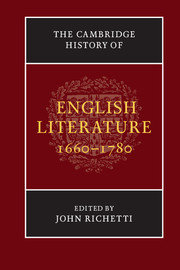Book contents
- Frontmatter
- Introduction
- PART I LITERARY PRODUCTION AND DISSEMINATION: CHANGING AUDIENCES AND EMERGING MEDIA
- PART II LITERARY GENRES: ADAPTATION AND REFORMATION
- 5 Restoration and early eighteenth-century drama
- 6 Dryden and the poetic career
- 7 Political, satirical, didactic and lyric poetry (I): from the Restoration to the death of Pope
- 8 Eighteenth-century women poets
- 9 Systems satire: Swift.com
- 10 Persistence, adaptations and transformations in pastoral and Georgic poetry
- 11 Political, satirical, didactic and lyric poetry (II): after Pope
- 12 Drama and theatre in the mid and later eighteenth century
- 13 Scottish poetry and regional literary expression
- PART III LITERATURE AND INTELLECTUAL LIFE: THE PRODUCTION AND TRANSMISSION OF CULTURE
- PART IV LITERATURE AND SOCIAL AND INSTITUTIONAL CHANGE
- PART V LITERARY GENRES: TRANSFORMATION AND NEW FORMS OF EXPRESSIVENESS
- PART VI CONCLUSION
- Chronology
- Bibliographies
- Index
- References
11 - Political, satirical, didactic and lyric poetry (II): after Pope
from PART II - LITERARY GENRES: ADAPTATION AND REFORMATION
Published online by Cambridge University Press: 28 March 2008
- Frontmatter
- Introduction
- PART I LITERARY PRODUCTION AND DISSEMINATION: CHANGING AUDIENCES AND EMERGING MEDIA
- PART II LITERARY GENRES: ADAPTATION AND REFORMATION
- 5 Restoration and early eighteenth-century drama
- 6 Dryden and the poetic career
- 7 Political, satirical, didactic and lyric poetry (I): from the Restoration to the death of Pope
- 8 Eighteenth-century women poets
- 9 Systems satire: Swift.com
- 10 Persistence, adaptations and transformations in pastoral and Georgic poetry
- 11 Political, satirical, didactic and lyric poetry (II): after Pope
- 12 Drama and theatre in the mid and later eighteenth century
- 13 Scottish poetry and regional literary expression
- PART III LITERATURE AND INTELLECTUAL LIFE: THE PRODUCTION AND TRANSMISSION OF CULTURE
- PART IV LITERATURE AND SOCIAL AND INSTITUTIONAL CHANGE
- PART V LITERARY GENRES: TRANSFORMATION AND NEW FORMS OF EXPRESSIVENESS
- PART VI CONCLUSION
- Chronology
- Bibliographies
- Index
- References
Summary
Poetry of the later eighteenth century is ‘after Pope’ creatively as well as chronologically. Much of it imitates, alludes to or reacts against the great poet of the first half of the century. Given how controversial Pope was in his own age, from the early Essay on Criticism (1711) to the final Dunciad (1743), it is remarkable that his name occurs nearly as frequently in poetry of the second half of the century. Pope's influence extends nearly everywhere in the decades following his death, from the work of younger contemporaries such as Mary Leapor, Joseph Warton, Thomas Warton, Mary Jones, Mark Akenside and Thomas Gray, who published mainly in the 1740s and 1750s, to later poets publishing major works in the 1780s, such as William Cowper and George Crabbe. Writers of such strength as Samuel Johnson and Christopher Smart, who both wrote early verse indebted to Pope, may seem to have outgrown his influence. But it seems likely that the mature Johnson would have written more than two major verse satires had Pope not written so many, and that the oracular eccentricity of Smart's later style flows in part from a need to distance himself from the conversational urbanity Pope had perfected.
Characterising the period in other respects has proven more difficult, and arguably the study of its poetry has suffered as a result. Assumptions that the period is ‘burdened’ by ‘anxiety’, that it is the ‘Age of Sensibility’, or that its most important features are ‘pre-Romantic’ all present problems that go beyond terminology.
- Type
- Chapter
- Information
- The Cambridge History of English Literature, 1660–1780 , pp. 287 - 315Publisher: Cambridge University PressPrint publication year: 2005
References
- 2
- Cited by



